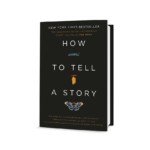When it comes to remembering people or companies, I have a confession to make – I’m not very good at it. However, I’ve noticed that as soon as I connect with a story about them, everything changes. Suddenly, their name and what they do sticks with me. For example, I recently met someone at an IFDA networking event in Boston, and despite following them on Instagram and LinkedIn, I couldn’t recall what they did. But then they shared a story about how they got into their industry, and suddenly everything clicked. I could remember their name and what their company did without any trouble.
The human brain is wired for storytelling. It’s no wonder why stories are such a powerful tool in business. From brand storytelling to sales pitches, stories can help connect with audiences and drive business success. But have you ever wondered why stories have such a profound impact on us? The answer lies in the neuroscience of storytelling.
Our brains are hardwired to respond to stories. When we hear a story, our brains release chemicals like dopamine and oxytocin. These chemicals are responsible for creating feelings of pleasure and trust. They help us feel connected to the story and the person telling it. This connection is what makes storytelling such a powerful tool in business.
Here are a few ways you can use the neuroscience of storytelling to drive business success:
- FIRST and foremost, be authentic in your storytelling: Authenticity is key when it comes to effective storytelling. Your audience can quickly pick up on insincere or forced narratives. By sharing genuine stories that align with your company’s values, you can create a more meaningful and impactful connection with your audience. Being honest and transparent in your storytelling can also help build trust and credibility with your customers.
- Create an emotional connection with your audience: Emotions are a powerful force in decision-making. When we feel connected to a brand or product, we’re more likely to buy it. By telling stories that evoke emotions like joy, sadness, or excitement, you can create a deeper connection with your audience.
- Use storytelling to build trust: Trust is essential in business. By telling stories that show your company’s values, you can build trust with your audience. People are more likely to do business with a company they trust.
- Make your message more memorable: These are quick tips for making a story memorable, including creating relatable characters, having a clear plot, using descriptive language, adding a unique twist, engaging the senses, exploring universal themes, using dialogue effectively, showing rather than telling, providing a satisfying conclusion, and using symbolism or metaphor.
- Use storytelling to inspire action: Stories can inspire people to take action. By telling stories that show the impact of your product or service, you can motivate your audience to take action.
The neuroscience of storytelling is a powerful tool in business. By creating an emotional connection with your audience, building trust, making your message more memorable, and inspiring action, you can use the power of storytelling to drive business success. So the next time you’re crafting a brand story or giving a sales pitch, remember the neuroscience of storytelling and use it to your advantage.

Full disclosure: We are not affiliated with or making any money off this recommendation, it’s just a good book.
Whether you’re trying to build trust, create an emotional connection, or inspire action, the power of storytelling is undeniable. If you want to improve your storytelling skills, I highly recommend reading “How to Tell a Story” from The Moth. Drawing on twenty-five years of experience, this book is the definitive guide to telling an unforgettable story in any setting. By following the expert advice in this book, you can take your storytelling skills to the next level and create a lasting impact on your audience.
